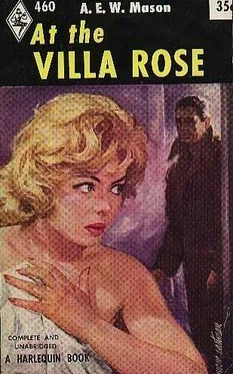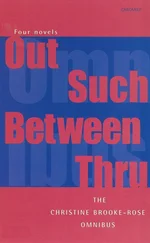A Mason - At the Villa Rose
Здесь есть возможность читать онлайн «A Mason - At the Villa Rose» весь текст электронной книги совершенно бесплатно (целиком полную версию без сокращений). В некоторых случаях можно слушать аудио, скачать через торрент в формате fb2 и присутствует краткое содержание. Год выпуска: 1910, Жанр: Классический детектив, на английском языке. Описание произведения, (предисловие) а так же отзывы посетителей доступны на портале библиотеки ЛибКат.
- Название:At the Villa Rose
- Автор:
- Жанр:
- Год:1910
- ISBN:нет данных
- Рейтинг книги:5 / 5. Голосов: 1
-
Избранное:Добавить в избранное
- Отзывы:
-
Ваша оценка:
- 100
- 1
- 2
- 3
- 4
- 5
At the Villa Rose: краткое содержание, описание и аннотация
Предлагаем к чтению аннотацию, описание, краткое содержание или предисловие (зависит от того, что написал сам автор книги «At the Villa Rose»). Если вы не нашли необходимую информацию о книге — напишите в комментариях, мы постараемся отыскать её.
At the Villa Rose — читать онлайн бесплатно полную книгу (весь текст) целиком
Ниже представлен текст книги, разбитый по страницам. Система сохранения места последней прочитанной страницы, позволяет с удобством читать онлайн бесплатно книгу «At the Villa Rose», без необходимости каждый раз заново искать на чём Вы остановились. Поставьте закладку, и сможете в любой момент перейти на страницу, на которой закончили чтение.
Интервал:
Закладка:
CHAPTER V
Julius Ricardo pushed aside the curtains with a thrill of excitement. He found himself standing within a small oblong room which was prettily, even daintily, furnished. On his left, close by the recess, was a small fireplace with the ashes of a burnt-out fire in the grate. Beyond the grate a long settee covered in pink damask, with a crumpled cushion at each end, stood a foot or two away from the wall, and beyond the settee the door of the room opened into the hall. At the end a long mirror was let into the panelling, and a writing-table stood by the mirror. On the right were the three windows, and between the two nearest to Mr. Ricardo was the switch of the electric light. A chandelier hung from the ceiling, an electric lamp stood upon the writing-table, a couple of electric candles on the mantel-shelf. A round satinwood table stood under the windows, with three chairs about it, of which one was overturned, one was placed with its back to the electric switch, and the third on the opposite side facing it.
Ricardo could hardly believe that he stood actually upon the spot where, within twelve hours, a cruel and sinister tragedy had taken place. There was so little disorder. The three windows on his right showed him the blue sunlit sky and a glimpse of flowers and trees; behind him the glass doors stood open to the lawn, where birds piped cheerfully and the trees murmured of summer. But he saw Hanaud stepping quickly from place to place, with an extraordinary lightness of step for so big a man, obviously engrossed, obviously reading here and there some detail, some custom of the inhabitants of that room.
Ricardo leaned with careful artistry against the wall.
"Now, what has this room to say to me?" he asked importantly. Nobody paid the slightest attention to his question, and it was just as well. For the room had very little information to give him. He ran his eye over the white Louis Seize furniture, the white panels of the wall, the polished floor, the pink curtains. Even the delicate tracery of the ceiling did not escape his scrutiny. Yet he saw nothing likely to help him but an overturned chair and a couple of crushed cushions on a settee. It was very annoying, all the more annoying because M. Hanaud was so uncommonly busy. Hanaud looked carefully at the long settee and the crumpled cushions, and he took out his measure and measured the distance between the cushion at one end and the cushion at the other. He examined the table, he measured the distance between the chairs. He came to the fireplace and raked in the ashes of the burnt-out fire. But Ricardo noticed a singular thing. In the midst of his search Hanaud’s eyes were always straying back to the settee, and always with a look of extreme perplexity, as if he read there something, definitely something, but something which he could not explain. Finally he went back to it; he drew it farther away from the wall, and suddenly with a little cry he stooped and went down on his knees. When he rose he was holding some torn fragments of paper in his hand. He went over to the writing-table and opened the blotting-book. Where it fell open there were some sheets of note-paper, and one particular sheet of which half had been torn off. He compared the pieces which he held with that torn sheet, and seemed satisfied.
There was a rack for note-paper upon the table, and from it he took a stiff card.
"Get me some gum or paste, and quickly," he said. His voice had become brusque, the politeness had gone from his address. He carried the card and the fragments of paper to the round table. There he sat down and, with infinite patience, gummed the fragments on to the card, fitting them together like the pieces of a Chinese puzzle.
The others over his shoulders could see spaced words, written in pencil, taking shape as a sentence upon the card. Hanaud turned abruptly in his seat toward Wethermill.
"You have, no doubt, a letter written by Mlle. Celie?"
Wethermill took his letter-case from his pocket and a letter out of the case. He hesitated for a moment as he glanced over what was written. The four sheets were covered. He folded back the letter, so that only the two inner sheets were visible, and handed it to Hanaud. Hanaud compared it with the handwriting upon the card.
"Look!" he said at length, and the three men gathered behind him. On the card the gummed fragments of paper revealed a sentence:
"Je ne sais pas."
"'I do not know,'" said Ricardo; "now this is very important."
Beside the card Celia’s letter to Wethermill was laid.
"What do you think?" asked Hanaud.
Besnard, the Commissaire of Police, bent over Hanaud’s shoulder.
"There are strong resemblances," he said guardedly.
Ricardo was on the look-out for deep mysteries. Resemblances were not enough for him; they were inadequate to the artistic needs of the situation.
"Both were written by the same hand," he said definitely; "only in the sentence written upon the card the handwriting is carefully disguised."
"Ah!" said the Commissaire, bending forward again. "Here is an idea! Yes, yes, there are strong differences."
Ricardo looked triumphant.
"Yes, there are differences," said Hanaud. "Look how long the up stroke of the 'p' is, how it wavers! See how suddenly this 's' straggles off, as though some emotion made the hand shake. Yet this," and touching Wethermill’s letter he smiled ruefully, "this is where the emotion should have affected the pen." He looked up at Wethermill’s face and then said quietly:
"You have given us no opinion, monsieur. Yet your opinion should be the most valuable of all. Were these two papers written by the same hand?"
"I do not know," answered Wethermill.
"And I, too," cried Hanaud, in a sudden exasperation, "je ne sais pas. I do not know. It may be her hand carelessly counterfeited. It may be her hand disguised. It may be simply that she wrote in a hurry with her gloves on."
"It may have been written some time ago," said Mr. Ricardo, encouraged by his success to another suggestion.
"No; that is the one thing it could not have been," said Hanaud. "Look round the room. Was there ever a room better tended? Find me a little pile of dust in any one corner if you can! It is all as clean as a plate. Every morning, except this one morning, this room has been swept and polished. The paper was written and torn up yesterday."
He enclosed the card in an envelope as he spoke, and placed it in his pocket. Then he rose and crossed again to the settee. He stood at the side of it, with his hands clutching the lapels of his coat and his face gravely troubled. After a few moments of silence for himself, of suspense for all the others who watched him, he stooped suddenly. Slowly, and with extraordinary care, he pushed his hands under the head-cushion and lifted it up gently, so that the indentations of its surface might not be disarranged. He carried it over to the light of the open window. The cushion was covered with silk, and as he held it to the sunlight all could see a small brown stain.
Hanaud took his magnifying-glass from his pocket and bent his head over the cushion. But at that moment, careful though he had been, the down swelled up within the cushion, the folds and indentations disappeared, the silk covering was stretched smooth.
"Oh!" cried Besnard tragically. "What have you done?"
Hanaud’s face flushed. He had been guilty of a clumsiness-even he.
Mr. Ricardo took up the tale.
"Yes," he exclaimed, "what have you done?"
Hanaud looked at Ricardo in amazement at his audacity.
"Well, what have I done?" he asked. "Come! tell me!"
"You have destroyed a clue," replied Ricardo impressively.
The deepest dejection at once overspread Hanaud’s burly face.
"Don’t say that, M. Ricardo, I beseech you!" he implored. "A clue! and I have destroyed it! But what kind of a clue? And how have I destroyed it? And to what mystery would it be a clue if I hadn’t destroyed it? And what will become of me when I go back to Paris, and say in the Rue de Jerusalem, 'Let me sweep the cellars, my good friends, for M. Ricardo knows that I destroyed a clue. Faithfully he promised me that he would not open his mouth, but I destroyed a clue, and his perspicacity forced him into speech.'"
Читать дальшеИнтервал:
Закладка:
Похожие книги на «At the Villa Rose»
Представляем Вашему вниманию похожие книги на «At the Villa Rose» списком для выбора. Мы отобрали схожую по названию и смыслу литературу в надежде предоставить читателям больше вариантов отыскать новые, интересные, ещё непрочитанные произведения.
Обсуждение, отзывы о книге «At the Villa Rose» и просто собственные мнения читателей. Оставьте ваши комментарии, напишите, что Вы думаете о произведении, его смысле или главных героях. Укажите что конкретно понравилось, а что нет, и почему Вы так считаете.












